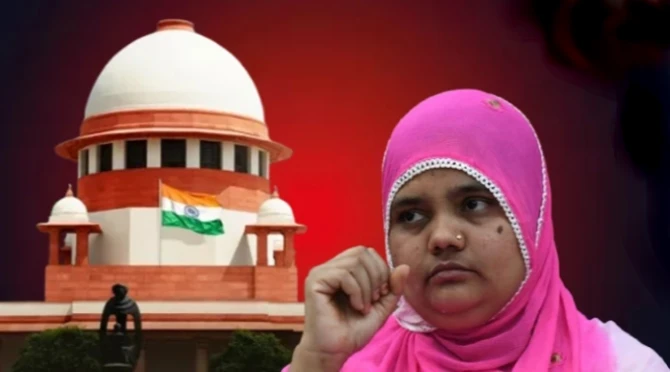
The Supreme Court on Friday declined to entertain a plea from two of the 11 convicts in the Bilkis Bano case, challenging the January 8 verdict that cancelled their remission.
A bench of Justices Sanjiv Khanna and Sanjay Kumar dismissed the plea as “absolutely misconceived,” questioning the maintainability of the Article 32 petition and stating that they could not sit in appeal over an order passed by another bench of the apex court.
Appearing for convicts Radheyshaym Bhagwandas Shah and Rajubhai Babulal Soni, Advocate Rishi Malhotra sought permission to withdraw the plea, which the bench allowed. Shah has also applied for interim bail.
In March, both convicts approached the Supreme Court, contending that its January 8 verdict cancelling their sentence remission was in conflict with a 2002 constitution bench order. They sought to refer the issue to a larger bench for “final” adjudication.
Shah and Soni, who are lodged in Godhra sub-jail following the apex court’s verdict, argued that an “anomalous” situation arose where two different coordinate benches had taken opposing views on the same issue of premature release and the applicable state government policy for remission.
The plea, filed through Malhotra, claimed that while one bench on May 13, 2022, directed the Gujarat government to consider Shah’s application for premature release under the state’s remission policy of July 9, 1992, the bench that ruled on January 8, 2024, concluded that Maharashtra, not Gujarat, had the authority to grant remission.
The plea stated, “With the greatest respect, the judgment rendered on January 8, 2024, directly contradicts the constitution bench decision in Rupa Ashok Hurra’s case of 2002 and needs to be set aside. Allowing this would lead to judicial impropriety and uncertainty about which precedence of law should apply in the future.”
It further questioned whether a subsequent coordinate bench could override an earlier bench’s judgment and whether such cases should be referred to a larger bench if the earlier judgment was believed to be based on a wrong appreciation of law and facts.
The plea sought direction to the Centre to consider the petitioners for premature release and clarify which judgment—May 13, 2022, or January 8, 2024—should apply to them. It argued that conflicting orders from two apex court benches of the same strength warranted referral to a larger bench for final adjudication.
On January 8, the Supreme Court dealt a significant blow to the Gujarat government by quashing the remission granted to the 11 convicts in the Bilkis Bano case. The court criticized the state for being “complicit” with the accused and abusing its discretion. It ordered the convicts, who had been prematurely released on Independence Day in 2022, to return to jail within two weeks.
The court also condemned the Gujarat government for “usurping” the power of the Maharashtra government to grant remission and nullified the May 13, 2022, judgment of another bench, which had directed the Gujarat government to consider the remission applications. This judgment was deemed to have been obtained by “playing fraud on the court.”
Bilkis Bano, who was 21 years old and five months pregnant, was raped while fleeing the communal riots triggered by the Godhra train burning incident in February 2002. Her three-year-old daughter was among the seven family members killed.




